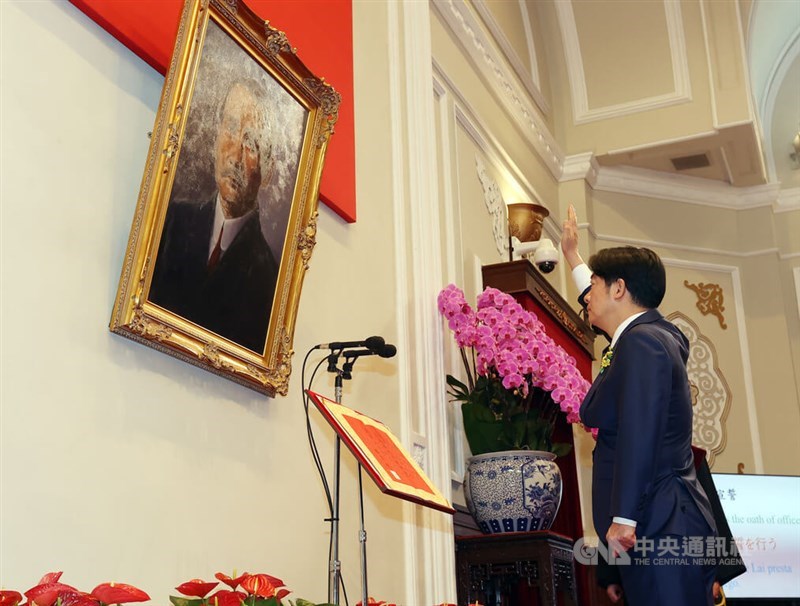
Taipei, May 20 (CNA) Lai Ching-te (賴清德) of the Democratic Progressive Party (DPP) was sworn in Monday as the fifth popularly elected president of the Republic of China (ROC), Taiwan's official name.
With Lai, 64, and Vice President Hsiao Bi-khim (蕭美琴), 52, taking office, the DPP will be the first ruling party to govern for a third consecutive four-year term since Taiwan held its first direct presidential election in 1996.
At the inauguration ceremony at the Presidential Office, Lai was handed the great seal of the nation by Legislative Speaker Han Kuo-yu (韓國瑜) of the opposition Kuomintang (KMT), symbolizing Lai's assumption of office as head of state.
The swearing-in ceremony was also attended by outgoing President Tsai Ing-wen (蔡英文).

A four-term legislator and two-term mayor of Tainan, Lai was Taiwan's premier from 2017 to 2019 under the Tsai administration and later became Tsai's deputy in 2020 when she began her second term.
Lai is also the first vice president to become president following the commencing of direct elections.
Hsiao Bi-khim (蕭美琴) was also sworn in as vice president on Monday morning, after which she and Lai walked Tsai out of the Presidential Office.
Shortly after the ceremony, Lai's first official duty was to sign a document officially appointing Cho Jung-tai (卓榮泰) as premier, or head of the Cabinet, Pan Men-an (潘孟安) as secretary-general of the Presidential Office, and Joseph Wu (吳釗燮) as secretary-general of the National Security Council.
He then presided over the swearing-in ceremonies of the senior officials before he and Hsiao received the foreign guests who attended his inauguration in the Presidential Office.

According to the Ministry of Foreign Affairs (MOFA), a total of 51 groups, comprising 508 foreign dignitaries, are attending the inauguration ceremony and related activities.
Among them, 12 groups are from countries with which the ROC has diplomatic relations, MOFA said.
Lai is set to deliver his highly-anticipated inauguration address in front of the Presidential Office Building around 11 a.m.
Lai and Hsiao won the presidential election on Jan. 13 after winning about 40 percent of the vote, giving the DPP another four years in power.
Candidates of the opposition KMT and Taiwan People's Party, who tried but ultimately failed to form a unified presidential ticket, split the remaining 60 percent.

The DPP, however, lost its majority in the Legislature after losing seats in legislative elections held the same day.
The KMT now has 52 seats in the 113-seat Legislative Yuan, while the DPP has 51, the Taiwan People's Party has eight, and independents ideologically aligned with the KMT hold two.
Update
● Full text of President Lai Ching-te's inaugural address
● U.S., Japan congratulate Lai on his inauguration as president
● Lai underscores democracy, 'four-pillar plan' for defense, diplomacy
● Lai urges Beijing to recognize ROC, calls for dialogue at inauguration
● Taiwan celebrates inauguration of new president
Related News
FEATURE/Lai to assume presidency amid geopolitical and domestic challenges
May 19: Lai pledges to continue on democratic path in reception remarks
May 18: President-elect Lai to present 4 key themes in inaugural speech
May 17: Incoming president vows to continue Tsai's unfinished work
May 17: 508 foreign dignitaries to attend Lai's inauguration: MOFA
FEATURE/Tsai's 8 years in government: Transforming Taiwan amid global challenges
Legislature reform bills
May 18: Amid chaos, bills on president's report to Legislature closer to passage
May 18: A quick take on why 'legislative reform bills' are hotly debated
- Society
Guanxin retains top spot as Taiwan's richest village
06/30/2024 08:49 PM - Business
Work starts on Taichung high speed rail shopping complex
06/30/2024 08:25 PM - Business
Taiwan's financial sector makes record January-May pre-tax profits
06/30/2024 04:45 PM - Culture
Don't let it bug you: Experts want bigger role for edible insects in Taiwan
06/30/2024 03:58 PM - Culture
Taiwan Technology X Culture Expo to open with 'Game' motif
06/30/2024 03:43 PM